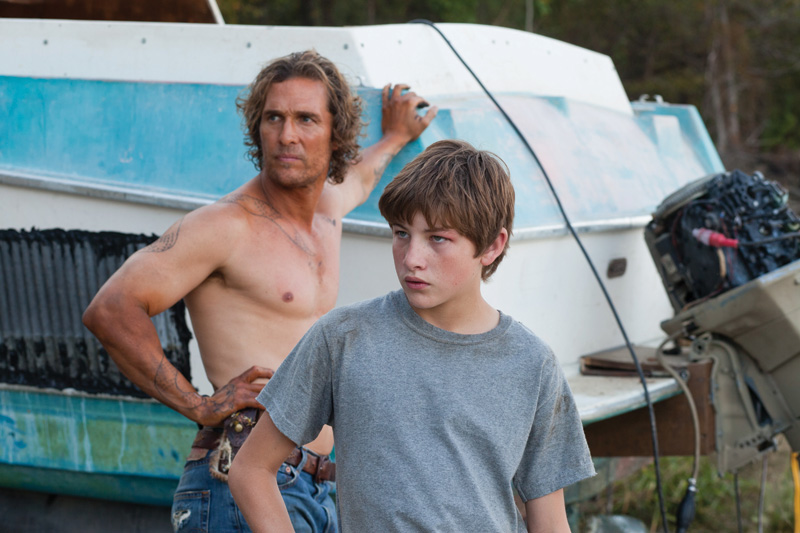
Matthew McConaughey Finds Meaning In Taking Off His Shirt In Jeff Nichols’ Mud
A version of this story ran in the June 2013 issue.
Above: Matthew McConaughey (left) and Tye Sheridan star in Jeff Nichols’ Mud.
There are two immutable laws in the modern movie universe. The first, known as Chekhov’s Gun, states that a loaded gun seen in the first act should be fired before the credits roll. The second, which I’ll call McConaughey’s First Law of Sartorial Dynamics, demands that if Matthew McConaughey appears in a movie, Matthew McConaughey must take his shirt off in that movie. About 20 minutes into Mud, the latest feature from Austin writer-director Jeff Nichols (Take Shelter), I realized that I was about to witness the miraculous blending of these two laws into a perfect mélange of cinematic foreshadowing and upper-body flaunting. At last, McConaughey has found a movie that makes taking off his shirt meaningful.
Nichols loves imbuing objects with meaning. Nothing in a Jeff Nichols movie happens for no reason, and nearly every object is a loaded gun. Especially a loaded gun. And a button-down shirt with talismanic powers. Like Take Shelter before it, Mud is filled with auguries, good-luck charms, bad-luck prophecies, divinations, and metaphor.
The man with the gun and the shirt is Mud, a mysterious, weather-beaten outlaw who, to avoid arrest, has taken up residence on an otherwise-unoccupied island in Arkansas’ stretch of the Mississippi River. (No matter the movie, the beach is McConaughey’s most natural environment.) Two 14-year-old boys—Ellis (played by the frustratingly handsome and talented Tye Sheridan from The Tree of Life) and his best friend, Neckbone (played by newcomer Jacob Lofland)—come upon Mud when they go to the island searching for a boat that ended up in a tree after a flood. Menacing but charming, Mud convinces the boys first to bring him food, then to help him get the boat out of the tree and repair it, and finally to arrange a meeting between Mud and his “girlfriend,” Juniper, who may or may not want to see him, and who is being menaced by the family of a man Mud killed.
In the meantime, Ellis watches the slow dissolution of his parents’ marriage. His mother is fed up with life on a shoddy houseboat with Ellis’ father, an unsuccessful fisherman bubbling with disappointment and self-contempt. Ellis being 14 (and a Jeff Nichols movie being a Jeff Nichols movie), he compounds two romantic scenarios in his head and believes he can fix one by enabling the other. His desire to help Mud get Juniper back is fueled by the anger and confusion he feels over the end of his own parents’ love and the budding romantic desires he’s feeling for the first time. This leads to all kinds of convenient thematic parallels and coincidences that would never exist outside of a movie script, and too often Mud feels like the product of an overeager film-school student. Every impulse Ellis feels in one part of his life is reflected perfectly in another, and every moment he experiences echoes with a kind of symbolic meaning that real life is rarely generous enough to provide.
Still, just because Nichols can’t resist the Biblical metaphor of a snakebite signaling the end of innocence (and just because he can’t resist foreshadowing that snakebite barely 10 minutes into the movie) doesn’t mean that Mud isn’t an affecting look at the death of childhood illusions and the sad realities of early adolescence. At its best, Mud is as insightful and honest as any movie ever made about the horrors and revelations of early adulthood—right up there with The 400 Blows and Rushmore. At its worst, Mud is a collection of cinematic contrivances and conveniences that pounds meaning into viewers’ heads, one bird tattoo, one snakebite and one loaded gun at a time.
Late in the movie, Neckbone’s older brother, who makes his living diving for oysters, tells Ellis to be wary of Mud: “This river brings a lot of trash down it,” he says. “You gotta know what’s worth keeping and what’s worth letting go.” That’s not the kind of thing people say; it’s a line written for a movie trailer, a desperate grasp for meaning and thematic cohesion in a world that Jeff Nichols should be smart enough to know is lacking in both. Leaned on too heavily, foreshadowing becomes predictability, and metaphor becomes a bludgeon.


